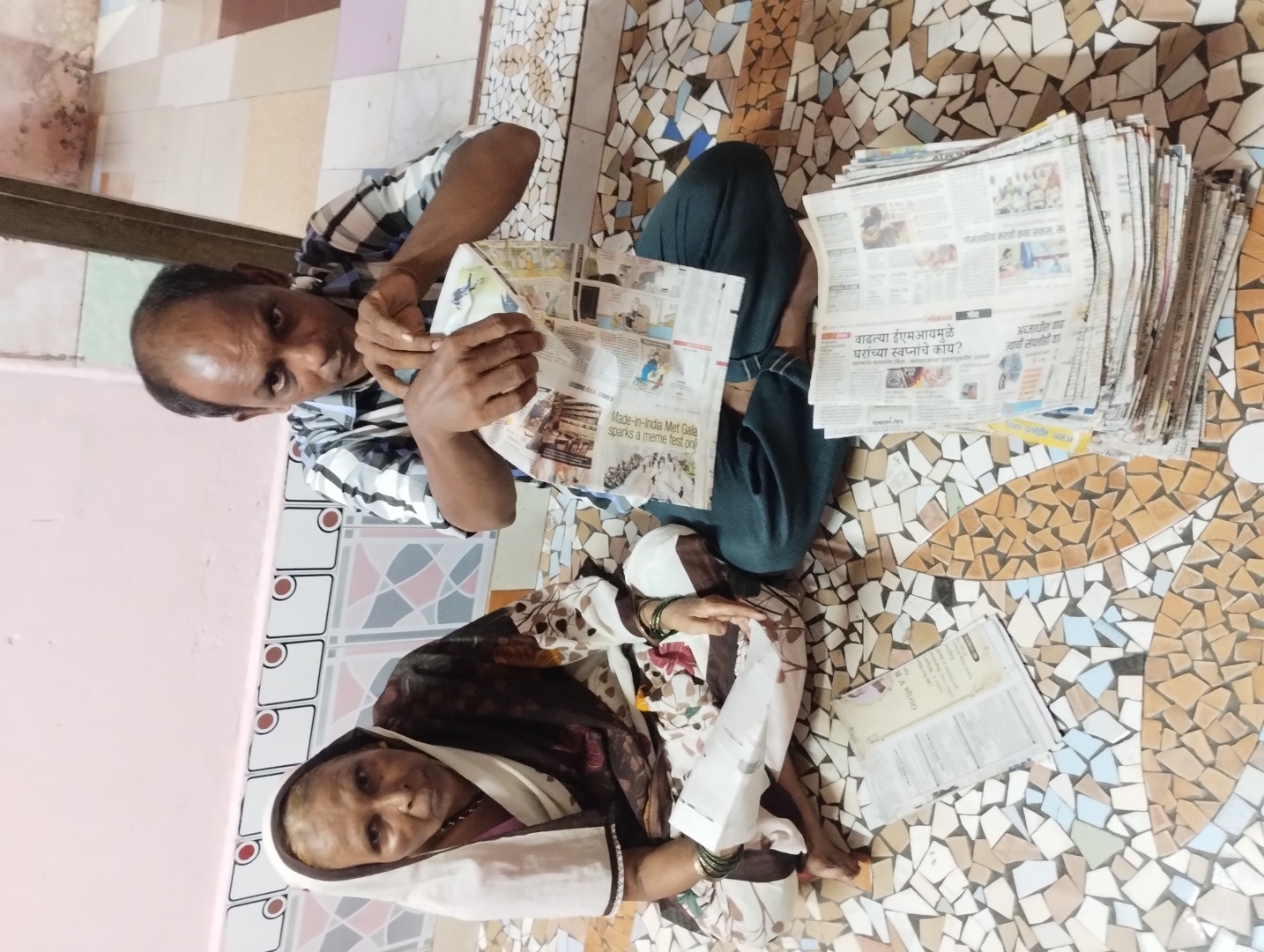XTRA SPECIAL

Bashir in the process of making his paper bags at his home in Tonca. His mother helps him too.
As the festival of lights, Diwali, is approaching, the only bread winner in his family Bashir Ahmed Nawara’s face lights up too, because for him festival translates into business. “Though every festival brings in some business, my paper bags during Diwali are sold sizeably. I have 500 pieces ready for Diwali and I am adding more to the stock each day,” shares Bashir as he folds and glues a paper bag with great difficulty, squatting on the tiled floor of his shanty home in a lesser known corner of Tonca in the capital city Panaji.
A person with 100% cerebral palsy disability, Bashir, lives with his elderly parents who are in their 70s. Bashir has crossed 40. He is unmarried and uneducated. He never went to any school, except for the few months that he spent in a special school in Panaji, Disha Charitable School, where he mastered the skill of making paper bags. The only skill he learnt and practiced then, wins him his daily bread now.
Sun or rain, Bashir is seen walking on the streets in Panaji, especially around the Miramar, Tonca and Taleigao area. Walking is indeed painful for him, but more painful is to sleep with hunger as company. So, he prefers walking instead of sleeping hungry. So every morning he follows a routine – of stepping out of his tiny home with a trolley to visit the homes in the neighbourhood to pick up old newspapers. Many homes keep their old newspapers for him. Some nearby shops also oblige him. He earns his living by collecting these newspapers and making paper bags out of them. The bags are sold to shopkeepers, pharmacies, grocery shops, fruit vendors and superstores. But there’s no fixed or regular customer who buys bags from him.
Making paper bags for the past 20 years, Bashir has learnt to earn his living with dignity. “Earlier he used to buy the papers, but as people know him now, he gets sufficient quantity of newspapers, free,” briefs his mother. He struggles to make 50-100 bags a day, sometimes even more, although all are not sold the same day. His income is not steady. His mother helps him in the bag making process.
“My old parents cannot work now, and I am the only bread winner in this home,” says Bashir. His illness has impaired his ability to speak and walk. He learnt to take first few steps at the age of 12. His father who tried hard to see if his slurred speech could be corrected, and his trembling walk could be made little steady, recalls. “I took Bashir to government hospitals when he was a small kid but I was told that his illness is not curable and he has to live with it.” The family accepted this and life continued. Bashir was the eldest in five siblings. After his younger brother died suddenly at 22, the responsibility to earn came to Bashir. He had to move out of his home to look out for work. It was then that he thought of utilising his skill of making paper bags – a skill he learnt at Disha Charitable School in Panaji.
“I purchased few kilos of old newspapers, and began making paper bags. Then I searched shops that could purchase these bags. It was tedious to convince people to go for paper bags when plastic bags were ruling the market. But steadily I could convince many. The organisation that supports the disabled in Goa, DRAG, also came to my help. Together, we spread awareness on plastic pollution and promoted paper bags in place of polythene,” recalls Bashir.
Bashir goes out twice a day, and picks up the newspapers. The bags are sold for Rs 1-2 as per the size. Sometimes he sells in bulk, of 50 or 100. Summers are better than monsoons, to walk on the streets, because the newspapers get wet in the rain. Sometimes the roads in Panaji get flooded too. But for Bashir, there's no holiday.
For known people in the vicinity he is Bashir. For unknown strangers, he could be anyone on the road who may look to be walking or talking under the influence of alcohol; because he cannot walk straight or talk properly. But that does not sadden him anymore, as deep down his heart he knows that it is due to his disability that his walk and talk is improper.
“One should not judge any person by his or her outer appearance, because the appearance may be deceptive many times, and the reality may turn out to be something else,” says the DRAG president who, despite his own disability, is known to be a strong pillar for many like Bashir.